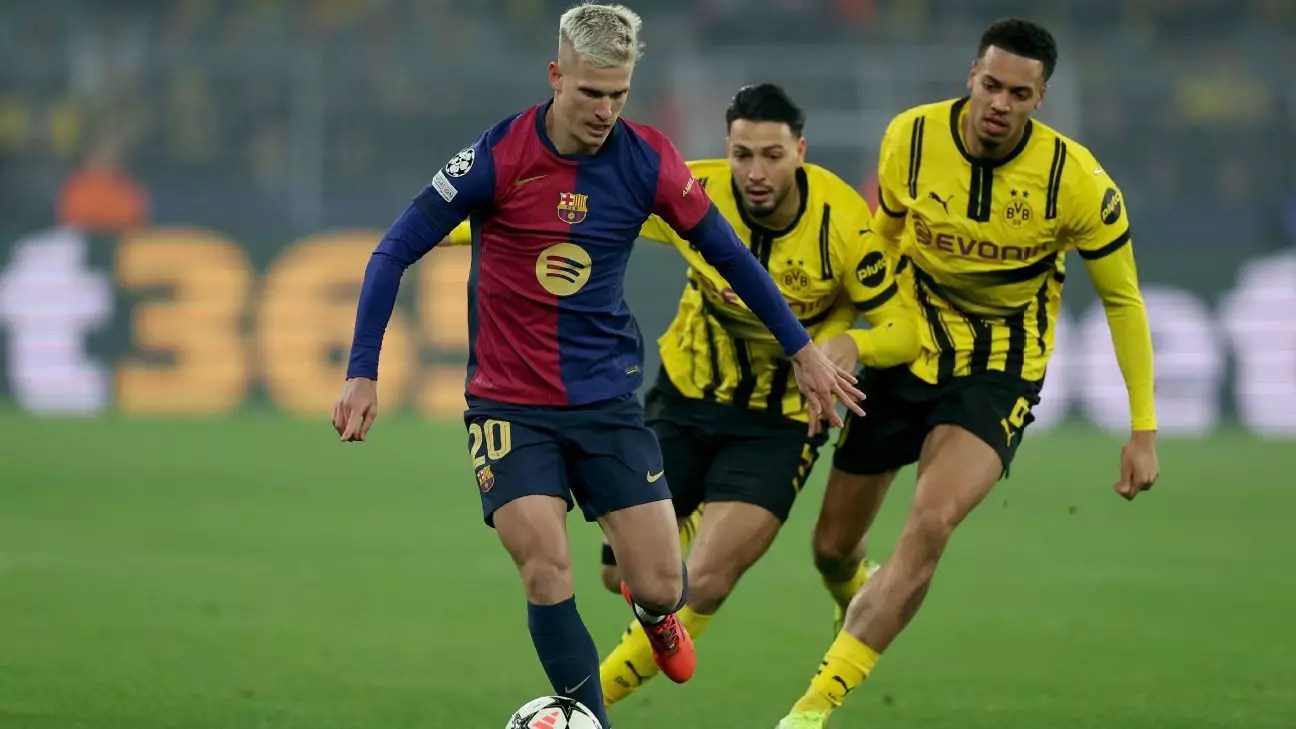In the vibrant realm of European football, Barcelona finds itself embroiled in a tension-laden narrative, epitomized by the club’s struggle to navigate financial constraints while striving to solidify its squad. At the center of this perplexing situation is Dani Olmo, a talented winger acquired from RB Leipzig, who currently faces uncertainty regarding his registration with LaLiga. The urgency surrounding his registration underscores the delicate balance Barcelona must strike between financial viability and competitive ambition.
Olmo’s path to becoming a fully registered Barcelona player has been anything but straightforward. Having joined the club in the summer window, he initially faced the setback of a temporary registration due to the financial crises that have plagued the Catalan club. The complexities of LaLiga’s financial regulations meant that Olmo was granted registration on a provisional basis, essentially as a stopgap measure following the long-term injury of Andreas Christensen. This interim measure, however, meant that Olmo was conspicuously absent from the club’s opening matches, thereby casting a shadow over his transition to the team.
Deco, Barcelona’s sporting director, has expressed a measure of optimism regarding Olmo’s permanent registration. Speaking to Movistar, Deco assured fans that efforts were underway to rectify the situation before the looming December 31 deadline. However, as he conveyed this optimism, there remained an underlying tension; the club must confront the stark reality of its financial limits as stipulated by LaLiga—a constitution that imposes spending caps based on club revenues and expenditures.
Barcelona’s spending limit for the current season has been set at approximately €426 million (around $447.5 million). This figure poses a substantial hurdle as the club seeks to not only register Olmo but also striker Pau Víctor, who finds himself in a similar predicament. To comply with LaLiga’s financial requirements, the club must either generate additional revenue or cut down on existing expenditures. Deco’s somewhat irritable retort—”These are internal issues at the club”—highlights the frustration inherent in these financial maneuvers. However, the stakes are high; if Barcelona cannot extend Olmo’s registration, he risked free agency, as a clause in his contract would allow him to leave the club if not registered in time.
Amidst these challenges, LaLiga president Javier Tebas has expressed faith in Barcelona’s ability to navigate this crisis, emphasizing the club’s historical resilience when faced with such financial challenges. As he articulated, “At the end of the day, they always manage it,” which serves to underscore the wider expectation that Barcelona’s management can conjure a solution.
Barcelona’s front office is currently strategizing on multiple fronts to rectify Olmo’s precarious situation. One noteworthy development has been the announcement of a new deal with Nike, which promises to enhance the club’s financial resources significantly. This deal is contingent upon approval from club members, with an important vote scheduled for December 21. This pending decision illustrates the intricate web of governance and member engagement that characterizes the club.
In addition to the Nike deal, discussions surrounding the sale of VIP box rights at the iconic Spotify Camp Nou are also under exploration. This revenue-generating avenue would not only monetize the club’s improved facilities but also provide immediate financial relief. Furthermore, sources indicate that additional investment avenues are being pursued, although these remain uncertain.
Ultimately, the last resort is for a board member to provide a personal guarantee, a move laden with risk but potentially necessary in guaranteeing the registration of Olmo and Víctor.
The situation surrounding Dani Olmo’s registration encapsulates the broader financial trials that major clubs, particularly Barcelona, face in modern football. Their endeavors to comply with stringent financial regulations while simultaneously fielding a competitive team form a precarious balancing act. As the December 31 deadline approaches, the pressure mounts for the club to secure a viable solution. While optimism from Deco and Tebas provides a glimmer of hope, the multifaceted challenges around financial management, club governance, and contractual obligations remain pivotal. Thus, as the winter transfer window looms, Barcelona’s ability to resolve this issue will not only impact Olmo’s future but may also set the tone for their overall strategy moving forward.


Leave a Reply